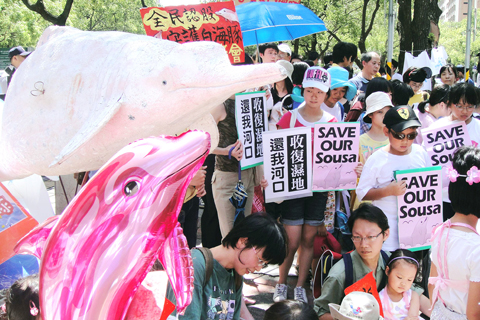|
Activists apply for wetlands purchase
BATTLING KUOKUANG: Environmentalists said that a petrochemical company and
the government would be unable to protect the Indo-Pacific humpback dolphin
By Loa Iok-sin
STAFF REPORTER
Thursday, Jul 08, 2010, Page 1

Conservationists and children hold placards
and inflatable of dolphins in Taipei yesterday during an appeal to the
government to protect wetlands.
PHOTO: CHANGHUA ENVIRONMENTAL PROTECTION UNION
Environmentalists and oyster farmers from Changhua County’s coastal areas
yesterday turned in an application for an environmental trust fund to purchase
coastal wetlands in the area before a petrochemical company acquires them to
build oil refineries.
“When we went to Kuokuang Petrochemical Technology Co [KPTC], asking them to
help protect the [Indo-Pacific humpback] pink dolphins, they said it was the
government’s job, but when we went to the government, the government told us it
was KPTC that was responsible for taking care of them,” Taiwan Environmental
Protection Union Changhua Division chairman Tsai Chia-yang (蔡嘉陽) told a crowd
outside the Ministry of the Interior (MOI) before a ministry representative came
out to take the application.
“It is time for us, the people, to stand up and act on our own,” Tsai said.
“This action is not only to save pink dolphins, but also to maintain the
integrity of the land, to protect the security of the food supply, and the
sustainability of the environment.”
KPTC, a subsidiary of of CPC, Taiwan Corp (台灣中油), plans to build refineries on
coastal wetlands in Dacheng Township (大城), Changhua County, near the mouth of
Jhuoshuei River (濁水溪).
The plan was met with opposition from environmentalists, local farmers and
fishers, who worry that oil refineries would cause severe and irreversible
damage to the local ecology — an area that serves as the habitat of the
critically endangered humpback dolphin — and the traditional oyster-farming
industry.
Chen Tsai-fa (陳再發), a 61-year-old oyster farmer, said the sea has provided
abundant resources to locals, and worried that pollution brought by oil
refineries would not only kill the humpback dolphin, but also destroy the land
and the centuries-old way of life.
“I’ve been an oyster farmer all my life and I have a brother who is a
fisherman,” he said. “Although my children are working elsewhere right now, they
can always come home and become fishermen or oyster farmers if they lose their
jobs.”
To prevent the construction of oil refineries, environmental groups launched a
campaign to call on the public to purchase a share of the land for NT$119 per
square meter.
The real estate price for the designated area published by the National Property
Administration is NT$100 per square meter.
“In the initial phase, we’re aiming to buy 200 hectares of the most sensitive
areas — but our goal is to purchase all 2,000 hectares KPTC plans to purchase
from the National Property Administration,” Tsai said. “Since we launched the
campaign in April, more than 31,000 people have expressed their willingness to
purchase 1.5 million shares, enough to purchase 150 hectares.”
Environmental groups set up an environmental trust fund to pool their money and
purchase the land.
Ministry official Huang Ching-mao (黃景茂) accepted the application from the
activists and promised that the ministry would begin to review the application
within a month.
Last night, Minister of the Interior Jiang Yi-huah (江宜樺) told media that as
there was no law concerning the creation of an environmental trust fund, the
ministry would first have to determine which government agency would be in
charge of the matter.
“The issue could be under the jurisdiction of the MOI, the Council of
Agriculture, or the Environmental Protection Administration. We will call a
cross-Cabinet meeting to determine who will be in charge of this issue,” Jiang
said. “If the MOI is in charge, we will take care of the matter as soon as
possible.”
“Personally, I’d be happy to see them [the activists], succeed,” he said.
|
![]()
![]()
![]()